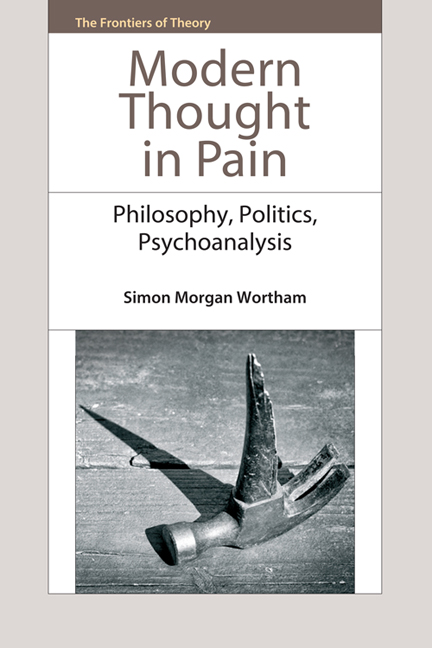2 - Distress I
Published online by Cambridge University Press: 05 September 2016
Summary
Thinking Feeling: Lyotard's Sublime
Writing on Lyotard's treatment of the Kantian sublime, Emilia Steuerman reminds us: ‘The sublime for Kant is the distance between the faculty of conceiving and the faculty of presenting an object in accordance with the concept.’ Thus, Lyotard contends, the sublime relates to what is unrepresentable according to our faculty of understanding or cognition. It involves cases where the imagination proves itself unable to present an object that, even if only in principle, might be conceptualised as such (and where any such attempt is experienced as, in the first instance, painfully inadequate, even if it ultimately gives rise to reason's pleasures). However, Steuerman observes, for Lyotard the sublime bequeaths its legacy to modern art in two modes. The ‘melancholic’ (which we might associate with ‘modernism’) emphasises the impotence of the faculty of presentation, and is engulfed by feeble nostalgia for lost plenitude. Meanwhile, ‘novatio’ (which we might think of in terms of postmodernism) foregrounds, in Steuerman's terms, ‘the potency of the faculty of conceiving which is not the faculty of understanding’ (p. 114). This mode is radically inventive, giving rise to new forms of art and thinking, although, by intensifying rather than resolving a breach between the ‘presentable’ and the ‘conceivable’, ‘novatio’ only heightens the admixture of pleasure and pain that we associate with the sublime. ‘Novatio’, however, does not lament an unpresentable ‘real’, or allude to its properly original yet perhaps ineffable existence, but instead invents – or reinvents – the rules and discourse of unpresentability (no longer constrained by a predominating faculty of understanding) in the interests of radicalising the ‘modern’ precisely by exposing it to the future anterior of itself.
Coming to his Lessons on the Analytic of the Sublime (first published in French in 1991), which provides Lyotard's most thoroughgoing explication of reflective or aesthetic judgment in Kant, we find the basis for this non-negative interpretation of the profound interplay of thought and feeling in the Kantian text. Here, Lyotard reads Kant in order to challenge the view that the third critique, the Critique of Judgment, achieves the latter's stated aim of reconciling the divisions bequeathed to philosophy by the Critique of Pure Reason and the Critique of Practical Reason taken together.
- Type
- Chapter
- Information
- Modern Thought in PainPhilosophy, Politics, Psychoanalysis, pp. 39 - 71Publisher: Edinburgh University PressPrint publication year: 2014



